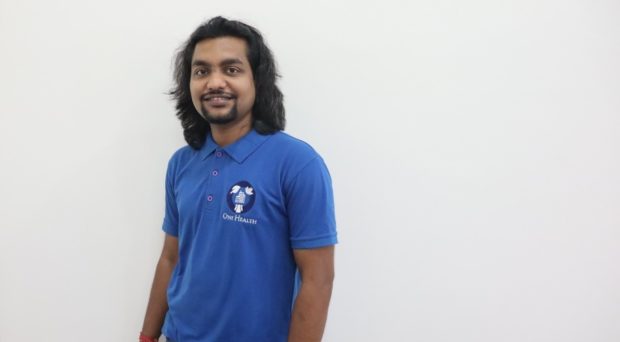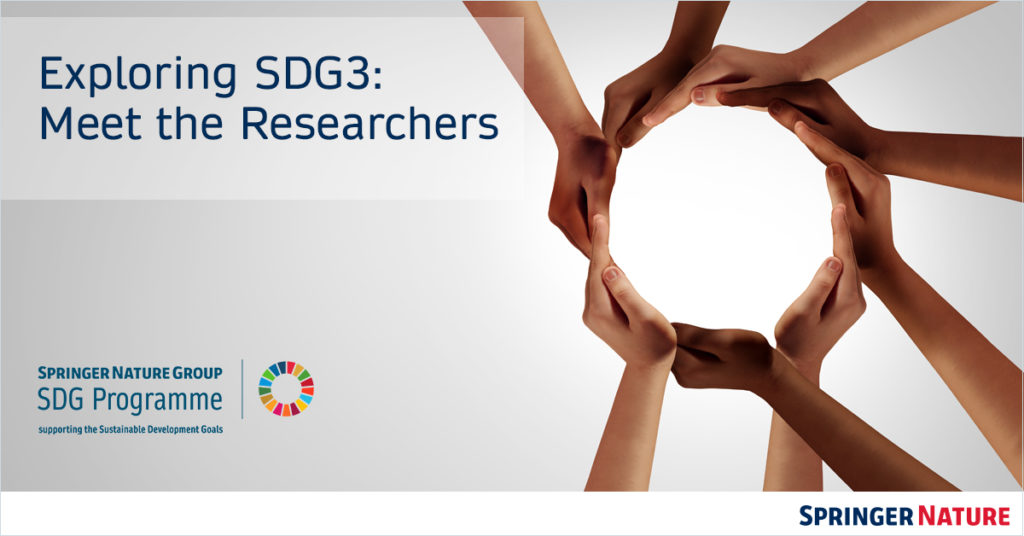
Welcome to our Meet the SDG3 researcher blog collection. We are interviewing a series of academics and practitioners working in diverse fields to achieve Sustainable Development Goal 3: Ensure healthy lives and promote well-being for all at all ages. You can find other posts in this collection here, and discover what else Springer Nature is doing to advance progress towards achieving this goal on our dedicated SDG3 hub.
Please tell us a bit about yourself.
I am a researcher interested in the trans-disciplinary issues on One Health. It took me a while to identify this as the area in which I wanted to contribute. Conventional health science disciplines felt somewhat limited to tackle the complex and urgent health issues we need to address collectively. As a Physiotherapist by graduation, I started my career as a clinical therapist in one of the clinics in Eastern India. As with others, I used to diagnose, treat, and rehab cases within a clinical setup, and my mindset revolved around a patient- and disease-centric approach.

Gradually, this evolved into considering the growing importance of preventive care, which led me to pursue further studies in the field of public health. I started a Master’s in Public Health specializing in Occupational and Environmental Health from the southern part of India. This platform provided me with an opportunity to understand the dynamics of risk in a broader sense, including the principles of preventive medicine and research methods. Although this transformation from clinical to preventive science was hard to digest for me at first, the viable environment of public health made me learn different aspects of health and disease. That was when I started to think out of the box about the diversity of risk factors and their dynamics on health, beyond disease.
With the post-graduation degree, I started my research career where I was involved in the impact evaluation of a public-private partnership for maternal healthcare, within health system research. Gradually, my work provided me with opportunities for exposure to other South-East Asian countries like Bhutan, Sri Lanka, Thailand and helped me learn public health skills.

The initial half-decade journey as a young public health professional in the research field provided me with an essential platform to understand the significance of emerging risk dynamics to resolve public health issues. I have been part of diverse research groups during this wonderful journey involving health system issues, infectious diseases, maternal and child health, adolescent health, environmental and occupational health, non-communicable diseases and global health with an interdisciplinary approach. I was fortunate enough to avail, two prestigious fellowships (Operational Research Fellowship-2015, India, and EBQ- VLIR-UOS Scholar-2016, Belgium).

To further expand my horizons, I started my doctoral research in the field of One Health at the University of Bonn, Germany, in 2017. Being a health graduate with experience in clinical and public health research, entering the world of One Health was a mesmerizing experience for me during the early days. Over time, this became my critical area of interest.
Although the One Health concept was originated from the idea of ‘one medicine’, its main focus is on a more comprehensive vision of human, animal, and environmental health for a healthier ecology. My key focus during my research was on health systems research and the principles of systems approach, exploring the convergence for effective prevention and control of zoonotic diseases. The wider applications of One Health have been openly clear with the ongoing COVID-19 pandemic. The research I carried out in the One Health field enabled me to understand and appreciate the in-depth interconnectedness of human health with animals and the environment.
In December 2020, I successfully defended my doctoral thesis at the Global Health, Institute for Hygiene and Public Health (IHPH), University Hospital Bonn, Germany. After earning my doctoral degree, I returned to my home country in early 2021. In continuation, I have facilitated the Center for One Health Education, Research, and Development (COHERD) establishment at the IIPHG, a unique center involved in global South-North collaboration.
How does your work relate to SDG3?
My works have always been closely interrelated to SDG3 on several fronts. When I started my public health career, I was fortunate to be provided a chance to work on a project named MATIND (Maternal health in India) Evaluation of state-led Public-Private Partnership scheme Chiranjeevi Yojana in Gujarat, India, which directly relates to the SDG 3.1, 3.7, and 3.8.

As I began to work more closely on SDG 3.3, 3c, and 3d on issues related to Water, Sanitation, and Hygiene (WASH) and diseases like Hepatitis, Tuberculosis, Dengue, and Sickle cell disease, I started envisaging myself becoming a health system researcher. My work resonated with other SDGs, such as integrating SDG 6 (Sanitation for all) with SDG 3 (Good health and well-being) through a study on randomized trials for improving toilet use in rural Gujarat, India.
These connections culminated in understanding the emerging risk dynamics to resolve public health issues. The other project where I have worked on was about the assessment of country capacity in initiating integrated disease surveillance system with climate data for Bhutan, Sri Lanka, Thailand, thus making SDG 3.3, 3c and SDG 13 converge, and this expanded my understanding of the complex linkages of health issues.
Progressing further, I explored the importance of SDG 17 (especially 17.6 and 17.14) for improving the SDG 3 targets through my doctoral research, abbreviated as RICOHA study, (Research to explore Intersectoral collaborations for One Health Approach) in India. One Health also emphasizes the connections across multiple SDGs such as SDG 6, 13, 15, and 17, for achieving the SDG 3 targets. All these experiences supported my focus on promoting the concept of Health in All Policies (HiAP) in my future research endeavors.
What’s the most pressing research question in your field and/or your hopes for progress in the future?
The need for multidisciplinary research aimed to disentangle the complexity of present challenges related to health and the environment has never been greater. Thus, SDG 3 could not be envisioned as a single entity. Until we haven’t been able to work collaboratively to understand the issues from other SDGs, this will be just a mirage.
While we try to solve this complex matter, where we have to think or re-think the health issues comprehensively rather than conducting research in silos, the One Health approach might be a source of hope. Applying One Health to research provides an opportunity for an enhanced understanding of a range of health impacts and solutions. By looking at multiple dimensions of the problem through the lens of environmental, animal, and human health on one stage, researchers may discover influencing factors that they would not have seen otherwise.
One Health provides an equal opportunity to understand the complexity of health for a graduate, either from human or animal medicine, as with the other graduates from the environmental, social science, economics, and management sectors and calls for future career enhancement scopes.
So far, my research on One Health has become guidance for operationalizing the One Health approach. In the future, I envisage One Health as an integrated approach to be implemented across many sectors, placing (one) health at the core of all policies. There are so many examples one can make – environmental protection is at the center of development of nations, and bioeconomy is directing the industry, labor systems, food systems, and land-use planning.
One Health can be the crucial foundation of all these sectors. It also emphasizes the importance of collaborative platforms within the health domain for integrated surveillance and knowledge exchange between sectors, ensuring that changes in pathogen densities in host populations are detected early. Appropriate measures can be taken before the occurrence of any spillover events. In simpler terms, One Health is a team and collaborative work for improving the health and well-being of the human, animal, environment.
Please describe hurdles you’ve come across during your career.
My journey from one clinic to one health was not smooth and easy. Leaving the clinical practice and entering preventive science was fascinating. However, justifying this choice with myself, my family and my friends in a country like India, is a challenge (the million-dollar question, why you want to do this? Sometimes I failed to answer even to myself). Also, hierarchies in academia and careers that progress slowly can be a challenge for an early-career scientist, and personal development can be hard to achieve as a result.
Beyond this, searching for a new project to work on, applying to a doctoral position, understanding which path I intended to walk, these were all remarkable hurdles for me, and shaped what I am today. Although it was not so easy for me, this decade of transition taught me many more life lessons. For instance, the importance of looking at the bigger picture; considering all possible sources of risks and their dynamics; considering systems approaches for complex problem solving; the interconnectedness of health; understanding whether prevention and early detection of risk is better than treat and cure.
Sometimes I feel those hurdles should be better termed as ‘learning milestones’ which helped me become a more complete researcher. Maybe the obstacles I encountered created the system thinker and scientist that is in me! My views of science is gradually evolving. I have also started to serve as an academic editor for PLoSONE (PLoS Group), section editor of Health services research for Archives of Public Health (BMC, Springer Nature), guest editor for One Health Outlook (BMC, Springer Nature), and handling editor for Risk Management and Healthcare Policy (Dove Press, Taylor & Francis), which make me sometimes question myself on how to judge the science, what should be the ideal way to envisage the future science, if we are actually on the right path, and so on.
Please tell us about a resource or person that has particularly inspired you?
I must owe very much to my parents. Although they were not much educated, they never stopped me from learning beyond the boundaries. Without them, I would’ve never reached the point where I am now. At the professional level, I am inspired by Professor Deepak Saxena, India, as he is a true visionary and a leader. He is the person who has guided me so far and always offers his helping hand when I am in need.
I have also been inspired by Professor Walter Bruchhausen, Germany, whose philosophical guidance and approach to health issues expanded my horizons. From him, I learned the value of international collaboration and multidisciplinary work. To date, we collaborate, we meet, and we hope to build the way forward together.
All of my mentors have been my true inspiration, and they have played a crucial role in my life and professional development. I’d like to return the favor if given a chance under any circumstances. In the end, we must work together to achieve the (One) Health for all!
You can find other posts in this collection here.
At Springer Nature we are committed to playing our role in advancing progress towards achieving SDG3 by both supporting researchers and being an active voice, promoting an interdisciplinary evidenced-based approach to all targets and indicators within this goal. Learn more about our SDG3 activities and the Springer Nature SDG Programme.

Comments